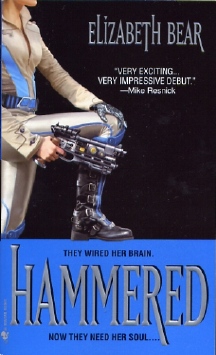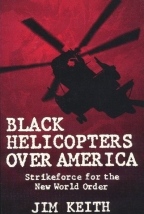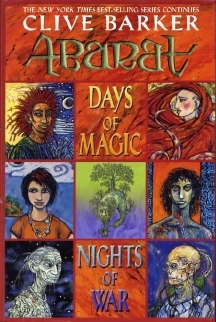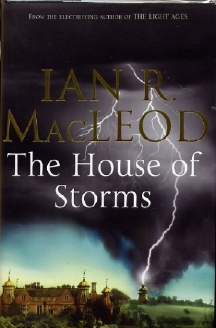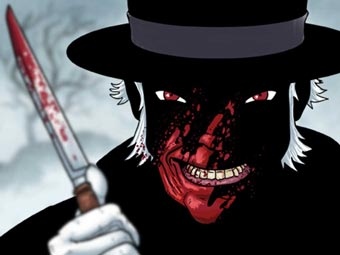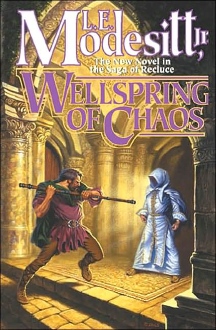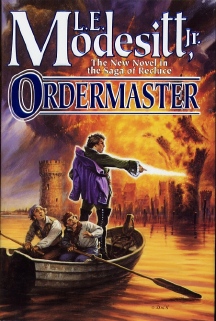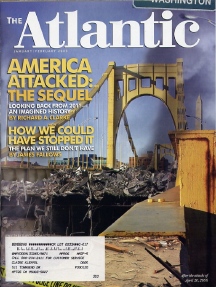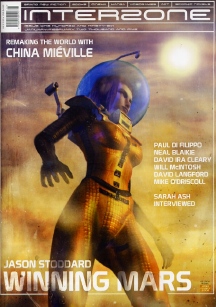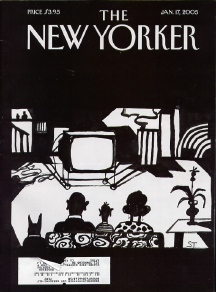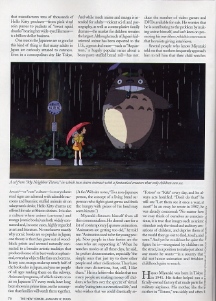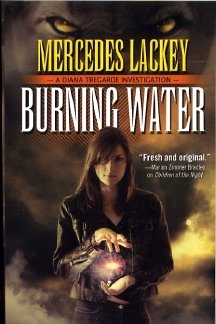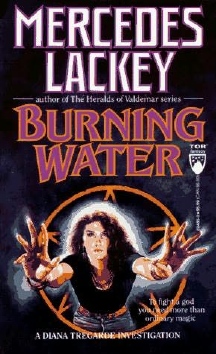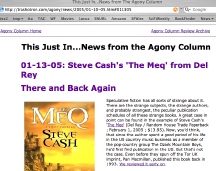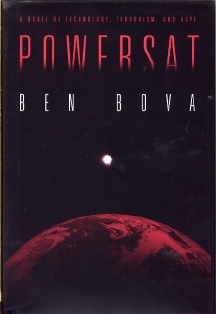|
|
|
This Just In...News from the Agony Column
|
01-21-05: Time to Get 'Hammered' With Elizabeth Bear |
|||||||||
Black
Helicopters Over America
A very astute editor over at Bantam Dell told me that 'Hammered' was a book I'd definitely like -- the same editor who is bringing Jon Courtenay Grimwood to the US. Her taste is impeccable, and her recommendations shoot to the top of my list. Then, after my article on Ms. Moriarty, wherein I expressed my wonder at the recent spate of UN-oriented novels -- her 'Spin State' and 'Singularity Sky' and 'Iron Sunrise' by Charles Stross -- she wrote to tell me that, " If you want a really fun UN-rules-the-world future vision (also written pre-Iraq, though published later due to the vagaries of publishing), I strongly suggest you check out the book HAMMERED by Elizabeth Bear." Consider me Hammered. And pretty damn astounded by the fact that this book is debuting as a mass-market paperback. Presumably, that makes it a lot easier for people to put it at the top of their "must-buy" list. Because this novel should certainly be there. And I can guaran-- oh wait, this isnt that article is, it? I can guarantee that this book will get a Philip K. Dick Award nomination, and a best first novel nomination, and she'll be up for a John W. Campbell award. Bank on it. But who gives a damn about the awards? The book's the thing.
But it's not the conspiracies themselves that frighten. It's the intended audience, the believers. Their vision of the UN building concentration camps in the US, where the jack-booted UN thugs will herd gun-owning Americans who resist their New World Order takeover is quite terrorizing, because you can practically see them standing before you, a glazed look of intensity in their eyes. You get the feeling that the kind of people who believe in this sort of thing are the kind of people who might feel it's a good idea to kill you in order to save you. From the UN.
But Bear extrapolates a world that's even more nightmarish for these folks than Moriarty. Because if you're scared of the UN taking over the US, then a novel in which Canadian UN Peacekeepers are quelling a rebellion in the US is going to send you screaming into the streets. Or perhaps more ominously, quietly, to your gun cabinet. In 'Hammered', it's 2062 and Jenny Casey, the jack-booted thugette on the cover is a bitter veteran of the wars that have ravaged the earth. She's given up her work for the Canadian Special Forces and is in the employ of a gangster. But her highly modified body is starting to wear out. The criminal life is neither safe nor secure. The novel begins when a delightful fellow named Razorface shows up at her door at 3:00 AM bearing the bleeding body of a young man. Things get worse after that. That's just the way of the world. And perhaps more, since I detect space travel somewhere along the lines here. If you've managed to miss Bear's appearances in any one of many science fiction magazines, well, then you have your argument for subscribing to and reading science fiction magazines that dare to publish unknown authors. If you've managed to move into a hardened underground bunker with a ground well and solar power -- I'd suggest that you give this book a pass. |
|
01-20-05: Enter 'The House of Storms' with Ian R. Macleod; BBC Does Sherlock Holmes, ESA Does Titan, Alastair Reynolds 'Chasing Janus', Les Edwards / Edward Miller, Clarion Auction Preview |
|||||||||
Lighting
Up Your Life
The choices in the fictional realm are many. China Miéville's New Crobuzon novels -- 'Perdido Street Station', 'The Scar' and 'Iron Council' all offer the kind of book that can expand to create a world around the reader, even if it's not our world. Phil Rickman's Merrily Watkins novels -- 'The Wine of Angels', 'The Cure of Souls', and 'The Lamp of the Wicked' -- offer a different but equally immersive experience in the Welsh landscape. Clive Barker's 'Abarat' and 'Abarat: Days of Magic, Nights of War' offer an experience that's immersive on two levels -- both with regards to the text and Barker's gorgeous illustrations. Readers should be aware that those illustrations are reproductions of huge paintings. When Barker tours with them, readers will experience a whole new dimension, literally, of Abarat. Charles Dickens is another author who offers that all-encompassing world. Would that I could visit the world of 'Great Expectations' for the first time again. There's no experience equal to losing one's self in a sea of language.
'The House of Storms', which was written under the working title 'Electricity' takes up a new story in the same world about one hundred years later. Aether has competition in the form of slowly developing technology. And England is on the brink of a civil war. Alice Meynell, the ruthless matriarch of the Great Guild of Telegraphers is powerless to save her son Ralph from the disease that ravages his body. She brings him to Invercombe to seek tranquility before he dies. In desperation, she takes him a nearby enclave of changelings, those most afflicted by the aether. And there, in the isolation of Einfell, Ralph is cured. But any cure, be it magical, practical or imaginary has a price. And Alice Meynell does not care what the price is or who will be forced to pay it.
This is not a book that you'll read in two days and forget in one. It's a book to savor, to read slowly so that your memories of reading are firm, and become a place you can go and visit. To me, that's the truest test of a novel's worth. If you as a reader can close your eyes and go the places in the novel, then you've found a work worth buying and keeping in hardcover. Simon & Schuster has made this easy. Larry Rostant's cover art has the kind of spacious but atmospheric feel that MacLeod's prose has. And the price -- £12.99 -- is quite reasonable as well. Very soon I'll be returning to Macleod's England, and I'm bringing back some pictures. When you've got a book like 'The House of Storms', you sometimes feel almost as if you should have a passport, some papers to identify yourself in the paper world. In case you get lost. |
|||||||||
Places
to Go, People to See
And while I'm sure many of my readers know about this, the European Space Agency has a website with constantly updated images from the Titan Cassini probe. I've been really stoked by this new mission, because the pictures we're seeing are quite reminiscent of the California coast. Forget mean-spirited naysayers like the San Francisco Chronicle's Peter Hartlaub. This guy wants the monkey in a suit. I want to see a new world, a world that looks far more complex than anything we've seen up close thus far. I wrote author Alastair Reynolds, who has many informal ties with the ESA, this morning to see what he had to say about the probe, and ask if he had worked on it. He told me that he knew some of the folks working on it though he had not done so himself. He also told me about his forthcoming novel, 'Chasing Janus'.
Readers will also want to take a look at the Les Edwards / Edward Miller websites, recently updated with a slew of new images, many from PS Publishing Titles soon to be covered here. Finally, readers who have too much money are highly encouraged to visit the Clarion Auction Site Preview. This is a PREVIEW. The auction will not start until 12:00 AM EST on Friday, January 28, 2005. DO NOT SEND IN YOUR BIDS UNTIL January 28! But for right now you can look at the droolworthy choices on display, which include awesome work from Hill House and Neil Gaiman. Clear your credit cards and don't tell your spouse where you found the link. I'll not be responsible for irresponsible purchases -- right! At least the readers (and their spouses) can sleep comfortably knowing that I've achieved levels of irresponsible book purchases so rarified that one might well consider them science fiction. |
|
01-19-05: L. E. Modesitt, Jr. is the First in 'Ordermaster' |
||||||
Language
Of and For Teens
L. E. Modesitt, Jr. has a much more aggressive schedule. Of course he does have two science fiction series and three fantasy series to work in. For some reason -- perhaps it's sales, huh? -- fantasy is much more prevalent than science fiction these days, something that causes endless hand-wringing amongst SF fans and writers. Obviously this isn't quite the case for Modesitt, whose 'Ordermaster' (Tor / Tom Doherty Associates; January 14, 2005 ; $27.95), is his first publication this year. And this year, I'm going to try to keep track of his books, and see how many first see the light of day. Count along with me readers: One! 'Ordermaster' slots in to the Recluce series, and is a direct sequel to 'Wellspring of Chaos', an entertaining adventure that introduced Kharl the cooper, your average beginning-of-the-fantasy-saga hero. That is, a quiet guy who lives a quiet life until. In this case, until involves stepping in to save a neighbor's daughter. The end of this journey leads to Egan, the corrupt son of a local leader. Kharl is arrested, nearly destroyed, but eventually is given an estate as a reward for his actions, where he settles down to once again lead a quiet life until. This time around, until involves a group of rebellious nobles. The fighting starts, wherein Kharl discovers his new ability to use order magery and shoot what look like laser beams out of his hands to more effectively SAY WHAT? Kharl discovers his new ability to user order magery and shoot laser beams out of his hands ARE YOU FUCKING KIDDING ME? Language! No, I'm not kidding you. You get this order magery thing right, and you can turn your hands into laser pistols or phaser pistols or Death Ray© pistols. Really. YOU'VE GOT TO BE SHITTING ME. I am not shitting you. Order magery, laser pistols, right here in the Recluce handbook. DID YOU SAY LASER -- That's my story and I'm sticking to it. Hush. Now, having mastered the whole laser beam hands deal -- or at least close enough for Royal Rebellion Suppression Work -- Kharl is not able to return to that quiet life. WELL NO FUCKING SURPRISE HE'S NOT.
In the interim, you can be assured that Modesitt will provide all the enjoyable accoutrements of a fast-paced, humor-laced fantasy adventure. You write twelve of these Recluce books -- like Modesitt has, among many others -- and you get pretty damn good at it. Moreover, Modesitt is reaching out to the YA audience by backing off on the profanity WHAT THE FUCK IS UP WITH THAT? YOU EVER HEAR A TEENAGER TALK? All the fucking time, my friends. And I can guaran-fucking-tee you that no matter how much you swear, you a) don't want your kids to use language like that b) don't want to buy them books that use language like that and c) will happily use the power of positive hypocrisy to reinforce the idea that they BETTER NOT USE THAT KIND OF LANGUAGE. ARE YOU I'm warning you. You see this palm? I don't read these kinds of books for nothing. YOU DON'T HAVE ORDER MAGERY OUCH! No but I can dope slap the next kid who comes in here with a mouth like that. Just be glad I didnt hit you upside the head with this book. At 480 pages, trust me, you'd rather read it than be hit with it. And you know what? In about nine months -- about the time school starts back up -- I'll have another one to hit you with. Read this one, pick up your room, do your homework. If you're lucky, I'll let you read a couple of his science fiction novels. There, you'll find that the laser pistols are laser pistols. And "Order magery" is what they say when they want to get take out food. |
|
01-18-05: Weeds of Fear and Fantasy; New Audio Interview Online |
||||||||||||||||
The
Periodical Table of Speculative Fiction
Apparently, some rules are going to get broken this year. Maybe we are getting just a smidgen into the damn future that we've all been hoping for -- and fearing. For this crop of articles suggests that we'll be making ample use of both emotions.
While Finney takes the lion's share of the new fiction in this month's Interzone, there's a lot more to make the little man jump out of his chair. (Our local newspaper uses one of those graphic-based rating systems for movie reviews, and were I to use it for Interzone, this one would have serious chair-jumping action.) You get the amazing Paul Di Filippo's 'The Emperor of Gondwanaland'. Di Filippo is the kind of veteran author that Interzone's old-guard readers have been hoping to see and he never disappoints. Neal Blaikie lives within driving distance of this writer, and debuts with 'Ducks in Winter', a beautifully surreal stellar-scale story. China Miéville gets the Interzone interview treatment, more of an essay than a conversation. Interzone also publishes and supports the James White short story award winner, 'Lost Things in Saved Boxes' by Deirdre Ruane. In a bit of synchronicity with Richard Clark, Ira Cleary reveals 'The Face of America'. Clarion graduate Will McIntosh gets this issue's Edward Noon illustration for his story 'Totems'. Mike O'Driscoll takes on the genre issue -- damn, I love that straw man, looks what he's doing for this article! The book reviews include Sandy Auden's Q&A with Sarah Ash, as well as a couple of mine. What more can you ask for?
In their "Have your read?" column, Bookmarks mentions the enjoyable 'Getting Mother's Body' by Suzan Lori-Parks. So here's my opportunity to mention that I now have an interview with this author by KUSP interviewer Jenn Ramage available for my readers as MP3 and RealAudio. You'd do well to send some donations to KUSP via their web page, as my involvement with this NPR affiliate helps keep this column cooking. Jenn is an outstanding interviewer and this KUSP is well worth support. Enjoy, contribute, and recognize that since I don't have ads and don't solicit contributions, you can probably spare a few pennies for KUSP -- but do mention this column if you donate! "Have You read?" also includes 'The Red Tent' by Anita Diamant, which was the demo-review that Katie Dean gave me a couple of years ago, is it now? Damn, time flies. And 'The Body: A Novel of Reincarnation' by Laurel Doud. A middle-aged mother of two wakes up in the body of a rich young man bent on self-destruction. Long articles cover E. M. Forester ('Howard's End' and the proto SF story 'The Machine Stops') and Albert Camus, author of 'The Stranger'. They also review a potentially intriguing book titled 'Tokyo Doesn't Live Here Anymore' by Ray Loriga. I'm going to see if I can lay my hands on it, for with its Phil Dickian memory-altering plot, it sounds potentially interesting. Moreover, reading it might give me a better bead on what 'Bookmarks' does with science fiction. In the SF category, they review Stephen King's latest Dark Tower novel and finally, finally, what made me open the magazine, a review of China Miéville's 'Iron Council'. Now 'Bookmarks' idea of in-depth reviews is certainly not mine. You dont get an essay about the pros and cons of the book -- you get a paragraph of plot summary, a paragraph of critical summary and blurbs from other publications in-between. Well, they're quickly read. Maybe they could call it '50 reviews to faster reading'.
And finally there's 'The Atlantic' which starts the year with a an impressively depressing piece of speculative fiction by Richard A. Clarke, the outspoken one-time national coordinator for security and counterterrorism under Presidents Bill Clinton and George W. Bush. I started the morning reading this and found myself deeply chilled and depressed by Clarke's vision. Sure, his pessimism may come to nothing. I remember a similar story from long ago by Paul Erlich, which condensed predictions from 'The Population Bomb' into about 4,000 words. While little of it came to pass as he wrote, the memory of reading that work clings to me to this day. It frightened the hell out of me, and Clarke's article did the same. Featuring photomontages by John Ritter, Clarke's article is so heavily footnoted to reflect the real concerns behind his speculations that the footnotes are almost as voluminous as the article. The article, he states at the end, isnt even a "worst case" scenario, as we manage to avoid a nuclear catastrophe. And it's not just the specter of Al-Qaeda attacks in malls, theme parks, subways and railroads that is frightening. Clarke makes a case for an horrific abrogation of our civil liberties. Internment camps, the military stationed in our cities and a cyberterrorism incident of mind-boggling proportions make today's already onerous Patriot Act look positively beneficent. With all these weeds of speculative fiction sprouting out of the ears and nose of American literature, one wonders how genre readers will respond. Will we pick up 'The Atlantic' so we can find our latest dose of high-quality speculative fiction? Will Richard Clarke get a Nebula nomination in what -- who knows, 2006? -- 2007? -- for this story? Will The New Yorker start running John Shirley's or Bruce Sterling's tales of Silicon Valley? Or perhaps Analog will run the next piece of hard science fiction by Richard A. Clarke. It's pretty wild out there, and the staid world of speculative fiction is going to have to work hard to keep ahead of reality. Hell, it's going to be hard to just keep up with reality. Given that you can now clone your cat -- if you're in the ultra-upper-crust of the American ordained aristocracy -- the recent science fiction anthology about Sfnal pets is starting to look pretty mundane. Here, kitty kitty! We've got a little surprise for you. Come and get your Class War! Or your War Class. Choose your future. Oh, no wait -- that choice is grayed out. |
|
01-17-05: Mercedes Lackey's Hot Supernatural Detective Tales! 52 Weeks of Daily Book News; Ben Bova Launches a 'Powersat' |
||||||
'Burning
Water' Walk With Me!
First issued as a mass-market paperback some sixteen years ago, it's apparently ready for its sophomore prom date with a new crop of readers, many of whom were not yet even conceived before the book was. These days, we have to shut off the television lest tales of teenage witches, suburban psychics and all sorts of supernatural mayhem overwhelm what's left of our capacity to say, balance a checkbook. But back in 1989, the idea might have been, as the cover blurb from Marion Zimmer Bradley referring to another book in the series says, "Fresh and original." Wait a second; I need to parse that statement a bit better for readers, just to make sure this does not escape them. The cover blurb for the book is perhaps as mysterious as the plot, which involves a psychic police detective, a witch who is an Earth Guardian, a romance novelist and probably a runway model, and a resurrected Aztec God. Be still my beating heart -- lest that ol' Aztec God decide to rip it out! Now that the plot's covered, let's get back to that blurb. "Fresh and original." --Marion Zimmer Bradley on Children of the Night Presumably it -- no wait the blurb's not about this book, it's about the sequel! Well, presumably, then, the sequel was fresh and original when it came out, some (checks dates) fifteen years ago. Well, now we know that the sequel can't have a driver's license, at least not here in California. Thank the fates! Can you imagine having both 'Burning Water' and "Children of the Night' behind the wheel! No wonder our insurance rates are skyrocketing. It's not a matter of tort reform, it's a matter of reprint reform!
I have to say that a quick scan turned up a leopard monster fighting a dragon / bird / dog-like thingie. So you can add "Has Monsters" in the plus column for this book. And if you're going to bring Mom to the Prom, then at least be happy that Mom is chasing Aztec gods instead of dreary old vampires. But there it is on page 179 -- somebody has to go back to "Aunt Nita's" house. Aunt Nita as in Anita Blake was still a gleam in Laurell K. Hamilton's eye when this book, and even the predictably vampire-based sequel referred to by the cover blurb. I'm guessing that you can expect "Children of the Night' (vampires) and 'Jinx High' (that's high school, not substance abuse) to follow in short and chronological order. I'm guessing that Aunt Nita, like Diana Tregard and probably even police detective Mark Valdez, brother to coffee-bearing Juan, is hot; he's hot, she's hot, they're all just a credenza away from being runway models. The Aztec God Trixhopamodel awaits you, with 330 pages of trade paperback sealed with a kiss. Don't worry about stilling that beating heart of yours. It's taken care of. |
||||||
My Personal Anniversary
But last year at this time, I decided that I would start writing book news five days a week, and, having written my way across Southern California over the Christmas Holiday, I can declare a successful close to a Year of News in the New Year. Having done it once, attempting to do so again seems natural. Or unnatural, which is certainly the normal state of affairs for me.
And I need to thank the readers at well, whose email usually turned up at about the time when I threatened to turn into Jack Torrance, the character from Stephen King's 'The Shining'. And since all work and no play makes Rick a dull writer, it's time to get decent rant going, to wit... |
||||||
Technology, Terrorism and Hard SF
The smart money, of course, says that Bova will be lucky to make a dent in the mainstream market, and that the walls of the ghetto will remain firmly in place. But for those of us who consider themselves professional apocalypse spotters, here's the next best thing to a seven-headed beast. Because 'Powersat' is a science fiction novel by a science fiction writer that could damn well be a mainstream novel by a mainstream writer. So what happens to a genre when it is no longer defined by content, but rather by the author's past publications? Alas, the trick is that genres are no longer in fact defined by either the author's publishing past or the content. Genres are defined by where booksellers shelve the books. We know that they are averse to shelving a single title in two genres, because, they tell us, it screws up their inventory. The question then breaks down to, "Where is the best place to shelve Ben Bova's 'Powersat' to maximize sales?" Let's take a look at the book before we answer that question. 'Powersat' is a near-future thriller in which Dan Randolph, head of Astro Corporation, has a plan to provide low-cost power through the user of an array of satellites. But as the novel begins, an experimental space-plane breaks up, leaving Astro on the edge of bankruptcy and Randolph's vision of an energy-independent America at risk. Worse, it looks as if the accident is no accident, but the result of sabotage. Randolph's plan involves setting up an array of geosynchronous satellites that will gather down solar power and "beam it down" to earth. This, we're told will break the backs of the oil cartels and break America's addiction to fossil fuels. And of course this makes Randolph all sorts of enemies. Terrorists on the left of him, oil barons on the right, and here he is, stuck in the middle with you. There's certainly a bit of intriguing genre content here. I'm curious as to how energy gets "beamed down" and collected in generators on earth. And I'm also interested in how this helps create energy independence since none of those generators are going to power the average car. None of this scans easily for science fiction novel. I read it and it doesn't make my brain light up and say, "Damn! Why doesn't somebody do that?!" But setting those reservations aside, what you do have here is as novel that could sit easily along any of the many technology-obsessed works of today's thriller writers. Presumably the only difference is that Bova's science is more likely to be up to snuff. So, one could either shelve and display it with the mainstream thrillers or toss it in the SF ghetto. Now in the SF ghetto, it does get a guaranteed audience. Bova's fans will look for his work in SF, not amidst the Tom Clancy novels, where this more properly belongs. So you either risk losing the base audience or missing the wider audience. What's the solution? The solution, ironically comes from the world of science fiction, and needs to be implemented by brave independent bookstore owners. The solution is computerized inventory that does not give a hoot which title gets shelves where. The solution is that independent booksellers need to start shelving books in more than one genre location in the store. The individual store managers and owners can make a difference, and if they start shelving single titles in multiple locations, then eventually, one suspects, the chains will as well. Innovations do spread out from individual bookstores to the chains. While it is sometimes sad to see this happen, in this case everyone benefits; readers, writers, booksellers and publishers. By shelving titles in genre ghettos and mainstream shelves, books will get more exposure. Everyone knows that genre ghettos have their uses. If you want a space opera, then you go the SF ghetto. Or even the SF Ghetto Bookstore. But by breaking down those barriers, booksellers will sell more books. And it will start with a decision to shelve a single book in multiple areas. What will be the first title into space? Will it be a mystery, an SF thriller, a horror thriller? All three genres have writers who have left their genres behind and found room in the shelves of mainstream literature. But here's what I say. Let's launch Ben Bova's book into the unknown regions of mainstream thriller literature. Hell, it a book about space exploration. That's appropriate, right? It's just a few small steps for readers -- but it heralds a giant leap for readerkind. "Mr. Josefowicz, TEAR DOWN THOSE WALLS!" |
